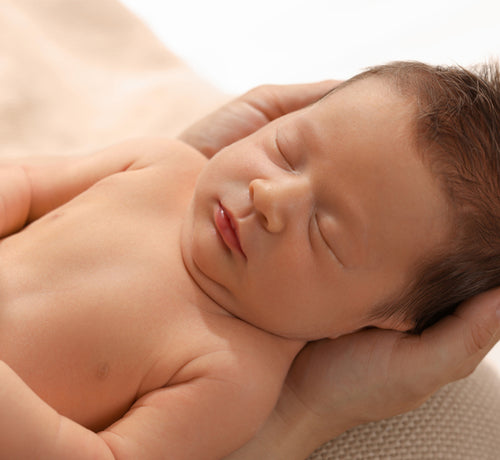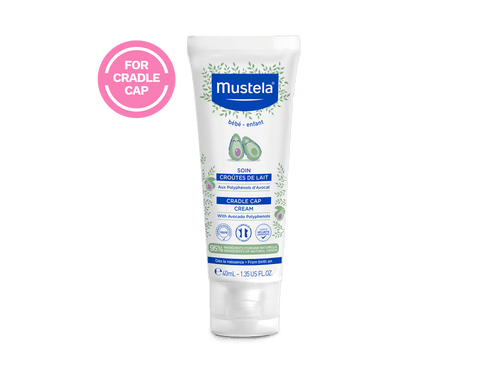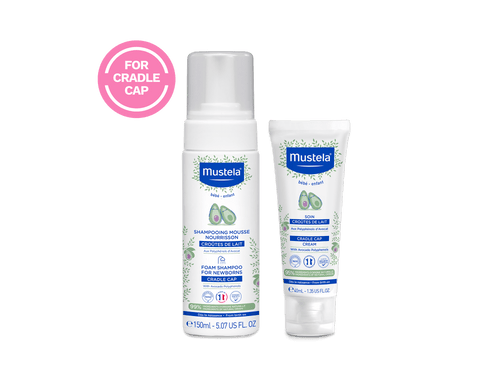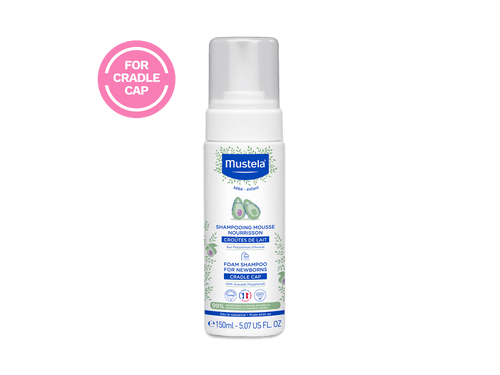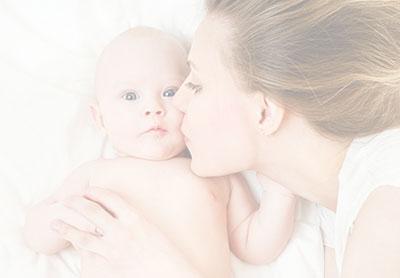Some newborns are born with a full head of hair, while others make their debut as bald beauties. In fact, newborn hair comes in every texture, color, and even location — from head to toe.
In this article, we’ll tell you what to expect when it comes to your newborn’s hair and how to care for it so your little one can have a good hair day every day.
Newborn Hair: What To Expect

It’s impossible to know for certain what your newborn’s hair will look like. They may be born with curly hair, pin straight locks, or no hair at all. As for color, it’s anyone’s guess.
So what can you expect when it comes to newborn hair growth? Even if the end result is a surprise, the overall timing and process remains the same, before and after your baby is born. Let’s take a look.
In Utero
Even when your baby is in your tummy, their hair is growing. In fact, your little one will get hair follicles on their scalp and body at about 14 weeks of gestation.
Then, at 16 to 20 weeks of gestation, your baby will start to get lanugo, the fine, feathery hair on their body and face. Lanugo will grow anywhere with hair follicles.
This hair serves a number of important functions: it helps the vernix (the white cheesy substance that covers the fetus) stick to the skin to protect the baby. It also regulates baby’s temperature and hormones, and keeps baby warm as they grow.
Thanks to melanin, the lanugo will get its initial color at about 23 weeks.
Your newborn will shed their lanugo by the time they are born. Losing this first hair often happens between 24 to 28 weeks of gestation, although preemies may be born with it. If your little one is born with lanugo, they’ll lose this hair after a few weeks to months on the “outside.”
At Birth

Hair is one of the most distinguishing characteristics your baby will have from birth. But don’t get too attached. That’s right: your baby’s shock of hair is in for some changes this first year!
Newborn Hair Loss And Growth
Before your newborn hits six months, it’s very likely that most of the hair they were born with will be lost. They might have had a wild mop those first months, and then suddenly go bald. Don’t worry, though. This is completely normal and it will grow back.
The hair loss has to do with a dip in your little one’s hormones (until now they’ve relied on your hormones). Losing their first head of hair is called the exogen phase.
The good news is that right after your little one loses the hair, new hair starts to grow. Keep in mind that this new hair, though, may look very different than the hair they had been born with.
Color Changes
Once your little one’s hair starts to grow again — usually between six and 12 months — as we said, there’s no telling the color or texture. If they were a blonde, don’t be surprised if they become a redhead.
If their hair was straight as an arrow, it’s possible that their new hair will be a mass of curls. It’s up to their particular brew of chromosomes. Genetics can combine a million ways!
Tips To Help Your Newborn’s Hair Grow
Although your newborn will grow their hair back quickly, there’s no harm in helping it along. Here are a few tips to help their mane become the main event once again:
- Minimize the time your newborn spends on their back when awake.
- Brush your little one’s scalp, even if they’re bald.
- Don’t brush wet hair — use a comb instead.
- Make sure your newborn eats healthily: breast milk for at least six months, and nutrient-dense foods once they’re on solids.
- Talk to your pediatrician about massaging coconut oil, an antioxidant rich in vitamin E, on your little one’s head after their bath a couple times a week.
How To Care For Your Newborn’s Hair

Wondering what your newborn’s new coif requires? Let “keep it simple” and “less is more” be your mantra. Here are some pointers on how to care for their tresses.
Use Gentle Hair Care Products
First of all, you’ll want to make sure that anything you use on your baby’s scalp is very gentle. Opt for a tear-free shampoo such as Mustela’s Foam Shampoo For Newborns.
This extra-gentle shampoo is tear-free, fragrance-free, and rinses easily. Our shampoo is made of 99% natural ingredients including avocado polyphenols and sunflower seed oil, and is hypoallergenic, so you needn’t worry about an allergic reaction.
Don’t Overwash
Although you do want to keep your little one’s hair clean, you don’t want to overwash it. Washing it too often will strip your baby’s hair of its natural oils.
For many, washing their newborn’s hair two to three times a week should be sufficient. However, for black or biracial children who have textured hair, you might want to limit washing to one to two times a week, and be sure to moisturize it well.
Remember, when you’re washing newborn hair (or your own hair, for that matter), use lukewarm water, so you don’t dry out their skin.
Avoid Pulling Or Tugging
This is probably pretty obvious, but you don’t want to pull or tug at your newborn’s hair. Their scalp is sensitive and their hair is delicate.
Try to detangle any knots before brushing and, again, be gentle. For children with natural hair, use a wide-tooth comb or soft-bristle brush, and avoid brushing it while it’s dry.
Use A Soft Towel To Dry Baby’s Hair
Be mindful when drying your newborn’s hair, and be sure to use a soft towel and a soft touch. If the towel or your drying method is too rough, it may lead to hair breakage (and an unhappy newborn).
Skip The Accessories
It’s too soon for the high pony or barrette or clip that tugs on their hair. As we said, your newborn’s skin and hair is delicate and accessories could scratch or irritate their scalp.
Give Your Baby A Head Massage

Stimulate your little one’s hair growth by giving them a head massage. Just cradle their head in your hands and gently massage their scalp with the tips of your fingers. Not only will it help their hair to grow, but it will also release tension, improve blood flow, and even help them sleep.
One note, massage time is not an invite to a shelf of new products. As we said in the beginning, less is more.
Try Some Tummy Time
Your newborn probably spends a lot of time on their back, which can result in friction and hair loss.
Flipping them over onto their tummy will not only help them keep their mane in place (as there is no inadvertent pulling or tugging), but it will also help them strengthen their neck muscles, develop motor skills, and avoid flat head syndrome.
Tummy time also promotes sensory development and bonding. That’s a whole lot of good things!
Treat Cradle Cap Early
Get ahead of cradle cap by treating your little one’s scalp as soon as you notice any scales. As cradle cap may have some relationship with hair loss, treating it sooner may pay off in the long run.
Our Cradle Cap Duo features both a delicate foam baby shampoo and a leave-on treatment to clean the hair and scalp, while soothing baby’s skin barrier. The tear-free, fragrance-free formula uses 99% natural ingredients that are both safe and effective for the condition.
Hold Off On Cutting Your Baby’s Hair
Another hair care tip for your newborn is to resist the urge to go to the hairdresser too soon. Although some say an early cut will make a baby’s hair thicker and grow better, there’s no evidence that’s true.
It’s best to wait until your baby can properly sit up in the chair, which means at least six months, when they develop head and neck control.
Go to a professional who’s used to cutting children’s hair, and then when it’s all done, snap a pic of your baby’s latest milestone and keep a lock for their baby book.
Love Your Little One’s Locks

Now you have a better idea of what to expect and how to care for your baby’s lovely locks (or lack there-of). You know not to panic when they inevitably lose their hair, and can enjoy the surprise of how their newborn hair grows back.
To keep your baby’s hair and scalp healthy, Mustela is here to help. Our Gentle Shampoo is tear-free, and will not strip the natural oils from baby’s hair. It’s composed of 95% plant-derived ingredients and is hypoallergenic.
Let Mustela help your little one have a good hair day from day one!


